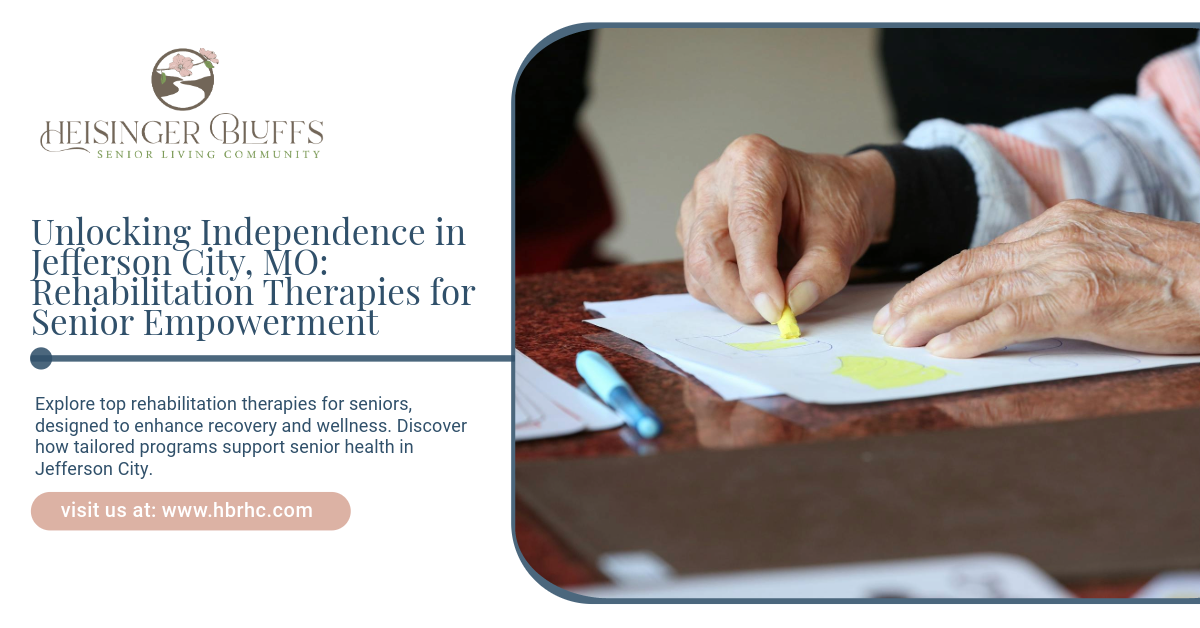Get in touch
Unlocking Independence in Jefferson City, MO: Rehabilitation Therapies for Senior Empowerment

Understanding Rehabilitation for Seniors in Jefferson City, Missouri
Rehabilitation therapies for seniors are an essential aspect of healthcare that focus on restoring and enhancing the functional abilities of elderly individuals. These therapies are crucial for seniors who are recovering from illnesses, surgeries, or managing chronic conditions.
The Role of Physical Therapy
Physical therapy plays a pivotal role in the realm of senior rehabilitation. It typically involves exercises designed to improve strength, balance, coordination, and range of motion. These activities are crucial for bolstering a senior's independence and reducing the risk of falls, which can lead to severe injuries. Physical therapists work closely with seniors to create exercise regimens that cater to their specific needs, with the ultimate goal of improving their ability to perform daily tasks without assistance. For more information on the customized exercise programs offered by local rehabilitation centers, visit Jefferson City rehabilitation centers.
Benefits of Occupational Therapy
Occupational therapy is another cornerstone of rehabilitation that significantly benefits seniors. This form of therapy focuses on enhancing a senior's ability to perform activities of daily living (ADLs) such as dressing, cooking, and bathing. The core objective of occupational therapy is to aid seniors in regaining independence and improving their overall quality of life. By using adaptive techniques and equipment, occupational therapists strive to make everyday tasks manageable for seniors, fostering a sense of self-reliance. To explore the benefits and programs related to occupational therapy, check out occupational therapy for elderly.
Improving Communication with Speech Therapy
Speech therapy is an integral component of senior rehabilitation that targets issues related to communication, cognition, and swallowing. This type of therapy is especially beneficial for seniors experiencing speech disorders, memory problems, and dysphagia, which can affect their ability to speak and swallow safely. Speech therapists employ various techniques to help seniors overcome these challenges, aiming to enhance their communicative abilities and cognitive functions. Speech therapy can significantly impact a senior's quality of life by improving their ability to express themselves and interact with others. For details on speech therapy and other senior rehabilitation programs, including those focused on communication improvement, please visit the provided link.
Overall, rehabilitation therapies for seniors, encompassing physical, occupational, and speech therapy, are geared towards promoting recovery, mobility, and well-being in a supportive environment, with personalized treatment plans tailored to each individual's needs. These therapies are a pathway to restoring seniors' independence and enhancing their ability to enjoy life to the fullest. For those seeking short-term rehabilitation services in Jefferson City, Missouri, it is essential to consider these rehabilitation therapies as part of a comprehensive care approach.
Short-term Rehabilitation Explained
Understanding the intricacies of short-term rehabilitation is crucial for caregivers and family members who are considering the best care options for their elderly loved ones in Jefferson City, Missouri. Short-term rehabilitation encompasses a variety of rehabilitation therapies for seniors designed to aid in the recovery from surgeries, injuries, or acute medical conditions.
Goals of Short-term Rehabilitation
The primary objective of short-term rehabilitation is to restore a senior's functional abilities, thereby enhancing their quality of life and fostering independence. These therapies aim to help seniors recover efficiently and reduce the likelihood of rehospitalization. Key goals include:
- Regaining mobility and strength
- Improving balance to prevent falls
- Recovering skills necessary for daily living
- Enhancing communication abilities impacted by medical events
- Facilitating a safe and timely return to community living
According to Buckner Retirement Services, the ultimate goal is to help seniors regain their independence, boost their confidence, and facilitate a safe return to their daily activities and social engagements.
Personalized Care Plans
To address the individual needs of each senior, short-term rehabilitation involves creating personalized care plans. These care plans integrate multiple therapeutic disciplines, often including:
- Physical therapy to focus on mobility and physical strength
- Occupational therapy for elderly to assist in mastering daily living activities
- Speech therapy to enhance communication and swallowing functions
The care plans are crafted by a multidisciplinary team of healthcare professionals, which may consist of doctors, therapists, and nurses, who collectively oversee the senior's progress and well-being. This collaborative approach ensures comprehensive care tailored to the unique challenges faced by each senior.
The flexibility of short-term rehabilitation settings allows for care to be administered in the most suitable environment for the senior, ranging from skilled nursing facilities to the comfort of their own home. For more information on the settings available in Jefferson City, refer to our guide on Jefferson City rehabilitation centers.
Through the implementation of these targeted care plans, senior rehabilitation programs work to maximize the potential for recovery and enhance the overall quality of life for seniors, allowing them to return to independence and participate fully in the community.
Choosing the Right Facility in Jefferson City, MO
When it comes to selecting a facility for short-term rehabilitation for seniors, the decision is a critical one for caregivers and family members. The choice often comes down to the specific needs of the senior and the level of care required for their recovery. In Jefferson City, Missouri, you have several options, including skilled nursing facilities, assisted living communities, and home-based rehabilitation. Each option offers different levels of care and services tailored to assist seniors in regaining their independence and returning to their daily routines.
Skilled Nursing vs. Assisted Living
Understanding the distinction between skilled nursing facilities and assisted living communities is essential to make an informed decision. Skilled nursing facilities provide comprehensive medical care and are staffed with healthcare professionals around the clock. They offer a higher level of care, which is ideal for seniors who have more complex medical needs that require close monitoring and regular interventions from medical professionals.
Assisted living communities, on the other hand, provide a more
independent living environment with access to care as needed. These are well-suited for seniors who need assistance with daily tasks but do not require intensive medical supervision.
| Facility Type | Level of Care | Medical Staff | Ideal For |
|---|---|---|---|
| Skilled Nursing | High | 24/7 | Complex medical needs |
| Assisted Living | Moderate | Available | Assistance with daily tasks |
To explore the rehabilitation facilities in the area, you can visit our list of Jefferson City rehabilitation centers.
Home-Based Rehabilitation Options
Home-based rehabilitation is another option that allows seniors to recover in the comfort of their own homes. This option is popular for those who prefer a familiar environment and a more personalized level of care. Home-based rehab can include various rehabilitation therapies for seniors, such as physical therapy to improve balance and mobility, and occupational therapy to assist with daily living activities.
The advantage of home-based rehabilitation is the customization of care plans to meet individual needs, and the flexibility it offers in scheduling therapy sessions. It's also conducive to family involvement in the recovery process, which can be beneficial for the senior's emotional well-being.
When considering home-based rehabilitation, it's important to ensure that the home environment is conducive to recovery, with adaptations if necessary, and that there is a reliable network of healthcare providers who can deliver the required services.
Whichever option you choose, it's crucial that the facility or service aligns with the senior's recovery goals, which include regaining independence, boosting confidence, and facilitating a safe return to daily activities. For more information on the tailored interventions offered in short-term rehab, consider reading about senior rehabilitation programs.
The Multidisciplinary Approach of Short-Term Rehabilitation
A holistic and comprehensive approach to rehabilitation is crucial for the successful recovery of seniors. A multidisciplinary approach leverages the diverse expertise of various healthcare professionals to address the complex needs of older adults undergoing rehabilitation.
Team of Healthcare Professionals
Rehabilitation therapies for seniors often require the coordinated efforts of a team of healthcare professionals. This team commonly includes, but is not limited to, physicians, physical therapists, occupational therapists, speech therapists, nurses, and social workers. Each member plays a vital role in assessing, planning, and implementing care strategies tailored to the individual's unique needs.
At facilities like Shaker Place Rehabilitation & Nursing Center, a collective of experts creates personalized treatment plans that focus on promoting recovery, enhancing mobility, and improving overall well-being. This collaborative effort ensures that all aspects of a senior's health are considered and addressed.
In Jefferson City, Missouri, senior rehabilitation programs and rehabilitation centers offer access to such multidisciplinary teams, making it a cornerstone of quality care for the elderly.
Tailored Interventions for Individual Needs
The interventions provided in a multidisciplinary rehabilitation setting are highly tailored to meet the individual needs of seniors. These personalized care plans take into account the senior's medical history, current health status, and rehabilitation goals. According to research, rehabilitation interventions are pivotal in aiding the recovery of frail older adults, especially following acute health episodes.
Tailored interventions also consider the senior's potential for improvement, which can vary greatly between individuals. Clinicians must make informed decisions about a patient's capacity to respond to rehabilitation, which can influence their access to necessary services. A team approach, centered around the patient's and caregiver's needs, is required to navigate the complexities of rehabilitation assessments effectively.
For seniors with specific conditions, such as advanced dementia, the interventions become even more specialized. Healthcare professionals experienced in providing care for such individuals participate in focus groups to ensure the rehabilitation practices are appropriate and effective.
By choosing the right short-term rehabilitation services that offer a multidisciplinary approach, caregivers and family members can ensure that their elderly loved ones receive comprehensive care. This approach not only addresses the senior's immediate physical challenges but also supports their long-term health and independence. The focus is not just on recovery but on empowering seniors to lead fulfilling lives with the highest possible level of function and autonomy.
Overcoming Challenges in Elderly Care in Jefferson City
As the senior population grows, the complexity of providing quality care, especially during critical health episodes, becomes more evident. Overcoming these challenges requires a multi-faceted approach, particularly when it comes to Intensive Care Unit (ICU) management and addressing complex healthcare needs.
ICU Management for Seniors
Elderly patients admitted to the ICU present a unique set of challenges due to the common occurrence of multiple chronic diseases which complicate their care. A study indicates that the care of elderly patients in the ICU differs fundamentally from that of younger patients, demanding specialized knowledge and skills. Advanced age correlates with worsened outcomes and a rise in mortality for critically ill patients in the ICU setting.
The decision to admit elderly patients with significant chronic diseases or limited life expectancy to the ICU has sparked debates, as high mortality rates among these patients pose ethical and resource allocation dilemmas. To address these issues, it's imperative for healthcare providers to weigh the benefits and drawbacks of ICU admission for seniors carefully.
To improve ICU management for seniors, the following strategies can be implemented:
- Enhancing nurses' attitudes towards elderly care.
- Modifying care delivery models to cater to seniors' specific needs.
- Improving care systems to provide fair treatment to the elderly.
By focusing on these areas, it is possible to develop a more appropriate system for elderly care in the ICU.
Addressing Complex Healthcare Needs
The current healthcare systems are often ill-equipped to meet the intricate needs of seniors suffering from various disabilities. As reported by a study, care processes and structures are lacking, and healthcare providers, including nurses, often do not possess the necessary capabilities to manage the physical and psychological requirements of hospitalized elderly patients.
To enhance the care of elderly patients, particularly in the ICU, the following obstacles must be tackled:
- Inadequate healthcare systems that fail to address seniors' needs.
- Lack of proper training for healthcare providers in managing complex cases.
- Insufficient resources and support for critical care of the elderly.
By recognizing and addressing these barriers, healthcare facilities, especially those in Jefferson City, Missouri, can improve their services. Jefferson City rehabilitation centers and short-term rehabilitation services can play a crucial role in providing the necessary care and support for seniors post-ICU care.
For caregivers and family members, understanding the complexities of ICU management and the broader challenges of elderly care is essential. Engaging with senior rehabilitation programs and exploring occupational therapy for elderly are proactive steps that can be taken to ensure their loved ones receive comprehensive and competent care, aimed at fostering recovery and independence.
Maximizing Short-Term Rehabilitation Outcomes
To ensure the greatest success in short-term rehabilitation for seniors, emphasis must be placed on the duration and quality of therapy time, as well as on family engagement in the recovery process. These elements are critical in fostering greater independence and functional improvement.
Importance of Therapy Time
The time invested in rehabilitation therapies for seniors has a significant impact on recovery outcomes. Research indicates that increased therapy time and the level of activity of patients during rehabilitation are vital predictors of better outcomes. For instance, patients who are more active and spend more time in therapy are more likely to return home, experience functional recovery, and have a shorter length of stay.
A study on stroke patients revealed that
at least 16 hours per week of high-quality therapy is essential for major recovery. Furthermore, an emphasis on task-oriented activities leads to improved functional recovery, independence in activities of daily living, and walking speed.
| Patient Group | Recommended Therapy Time (per week) | Expected Outcomes |
|---|---|---|
| Stroke Patients | At least 16 hours | Major recovery, improved independence, and walking speed |
Healthcare providers, including nurses, are encouraged to integrate rehabilitation goals into daily care, which can substantially increase the time seniors spend on therapeutic activities. This approach is particularly crucial during periods when professional therapists are not available. For more information on personalized care plans, visit our short-term rehabilitation services.
Family Involvement in Recovery
Family involvement is another cornerstone of successful rehabilitation. The support and encouragement of family members can greatly enhance the motivation and morale of seniors undergoing rehabilitation. Engaging family members in the recovery process not only provides emotional support but also helps reinforce the therapy goals set by healthcare professionals.
Training family members in simple therapy exercises and involving them in daily activities can extend therapeutic benefits beyond scheduled therapy sessions. This collaborative effort ensures that seniors receive continuous care and helps maintain a consistent level of therapeutic engagement.
For caregivers and family members looking to be more involved in their loved one's rehabilitation, resources and programs are available that offer guidance on how to effectively support the recovery process. These resources can be found through senior rehabilitation programs and Jefferson City rehabilitation centers.
By prioritizing ample therapy time and incorporating family involvement, seniors can maximize their rehabilitation outcomes, paving the way towards regaining independence and improving their quality of life.
Short-Term Rehabilitation Therapies and Functional Improvement
Rehabilitation therapies are essential for seniors to maintain and enhance their functional abilities. These therapies are designed to help older adults regain or improve their physical capacities, which are crucial for everyday living.
Enhancing Balance and Mobility
Balance and mobility are fundamental to a senior's independence and safety. Physical therapy for seniors often involves exercises aimed at improving strength, balance, coordination, and range of motion. Such exercises lead not only to increased autonomy but also to a reduced risk of falls, which are a significant concern among the elderly population. By participating in short-term rehabilitation services, seniors can restore their skills and abilities, thereby enhancing their quality of life and minimizing the likelihood of hospital readmission.
Assisting with Daily Living Activities
The goal of rehabilitation therapies is not just to improve physical function but also to enable seniors to perform daily living activities with greater ease. Occupational therapy, in particular, focuses on assisting seniors in mastering the tasks required for independent living, such as dressing, cooking, and personal hygiene. Occupational therapy for elderly individuals is tailored to help them adapt to their physical limitations while maintaining a sense of autonomy.
Fostering Independence and Confidence
Beyond the physical improvements, rehabilitation therapies play a significant role in fostering independence and boosting confidence among seniors. As they regain mobility and strength through personalized care plans, they find themselves able to engage more fully in activities they enjoy. This renewed engagement can have a profound impact on their overall well-being, including mental health and social participation.
For families and caregivers seeking the best care options,
Jefferson City rehabilitation centers offer various
senior rehabilitation programs that address the unique needs of the elderly. By choosing the right facility and ensuring a multidisciplinary approach to care, seniors in Jefferson City, Missouri, can maximize their rehabilitation outcomes and enjoy a higher quality of life.



Want to know more?
We will get back to you as soon as possible.
Please try again later.
You May Also Like To Read
Heisinger Bluff’s Life Plan Community is here to make your senior years safe, stimulating and enjoyable so that you can savor the present, knowing the future will be taken care of.
QUICK LINKS
CONTACT
©2024. Heisinger Bluffs. All rights reserved.








